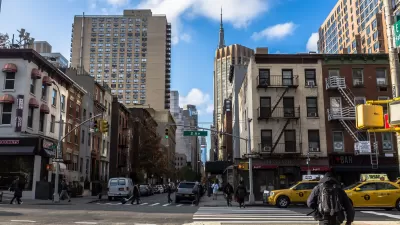Turning its attention from trimming waistlines to expanding skylines, Matt Chaban delivers the details on the Bloomberg administration's proposed upzoning for the east side of Midtown Manhattan.
Unveiled at a presentation to Community Board 5 last night, the city's massive upzoning plans for 74 blocks on the eastside of Manhattan between 39th and 57th Streets are aimed at, "preparing the Central Business District for a major modernization over the coming decades."
So how big is the upzoning? "It is big. No, really big. Bigger than almost anything the city has ever seen. Empire State Building big," writes Chaban. Densities in select blocks will be bumped to floor area ratios of between 18-24, by right. Developers will be able to apply for FAR bonuses in some areas, including the Grand Central core subdistrict, where "a whopping 30 FAR" will be possible, "on par with the
skyline defining Empire State Building (FAR of 33, the only thing in
town that comes close)."
"While supportive of the idea, the community board was taken aback by
many of the proposals. 'The amount of density here is incredible, and I
applaud the city for being ambitious' Mr. Mann [chair of the board's transportation committee] said. 'But I don't think
many of the issues have been thought through that will keep Midtown from
being overwhelmed.'"
One important element of the proposal pointed out by Chaban is a "sunrise provision" that puts off the application of the changes until 2017. According to Chaban, "This is meant as a protection for the city's considerable investment in
Hudson Yards-Mr. Ruchala [project manager for the rezoning from the Department of City Planning] called that 'our top priority'-but that left
many on the board wondering why this rezoning could not simply wait five
years. Their explanation, at times implicit, occasionally explicit, was
that the administration, and its partners in Big Real Estate did not
feel it could wait."
FULL STORY: How About Another Empire State Building or Two? City Outlines Mega Midtown East Rezoning

Maui's Vacation Rental Debate Turns Ugly
Verbal attacks, misinformation campaigns and fistfights plague a high-stakes debate to convert thousands of vacation rentals into long-term housing.

Planetizen Federal Action Tracker
A weekly monitor of how Trump’s orders and actions are impacting planners and planning in America.

In Urban Planning, AI Prompting Could be the New Design Thinking
Creativity has long been key to great urban design. What if we see AI as our new creative partner?

King County Supportive Housing Program Offers Hope for Unhoused Residents
The county is taking a ‘Housing First’ approach that prioritizes getting people into housing, then offering wraparound supportive services.

Researchers Use AI to Get Clearer Picture of US Housing
Analysts are using artificial intelligence to supercharge their research by allowing them to comb through data faster. Though these AI tools can be error prone, they save time and housing researchers are optimistic about the future.

Making Shared Micromobility More Inclusive
Cities and shared mobility system operators can do more to include people with disabilities in planning and operations, per a new report.
Urban Design for Planners 1: Software Tools
This six-course series explores essential urban design concepts using open source software and equips planners with the tools they need to participate fully in the urban design process.
Planning for Universal Design
Learn the tools for implementing Universal Design in planning regulations.
planning NEXT
Appalachian Highlands Housing Partners
Mpact (founded as Rail~Volution)
City of Camden Redevelopment Agency
City of Astoria
City of Portland
City of Laramie



























